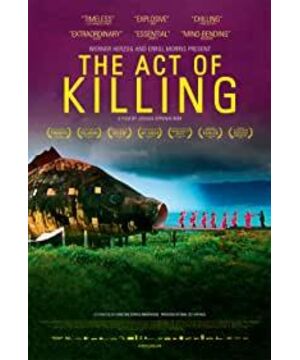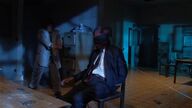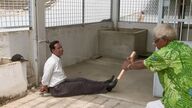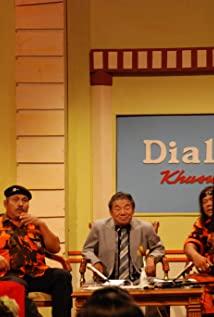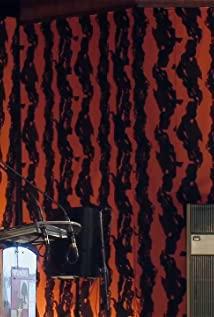The documentary "Deduction of Killing" can be regarded as the one that shocked me the most recently.
The background of the documentary is this: During the “anti-communist cleansing movement” of the Indonesian military government from 1965 to 1966, more than one million Indonesian Communists, leftists, intellectuals, and Chinese were brutally massacred. In order to evade responsibility, the Indonesian military Fang handed over the killing task to the local gangsters. In the process of this massacre, many innocent people, including ordinary peasants, workers, and intellectuals, were labelled as the Communist Party and brutally murdered. The Chinese were the biggest victims.
Before seeing the introduction of this documentary, I had never even heard of the existence of this period of history, and after watching this documentary, I was deeply shocked-as if to see "the hell is empty, the devil is in the world "A model room.
The documentary was filmed in 2012, more than 40 years after the anti-communist genocide movement. It is said that when director Joshua Oppenheimer wanted to make a documentary on this subject, he first sought out the survivors and the families of the victims, but they were silent about this period of history and did not dare to mention it. Some even suffered personal threats, so they suggested the director: "Go to the murderers, they will be happy to brag about these things to you."
So Joshua found the famous executioners at the time, one of whom was the protagonist of the documentary-Anwar Gango. The director told them to help them shoot a film about the "anti-communist slaughter" that year, so that they can recreate the history of murder. Sure enough, they became excited when they heard it, and immediately yelled that they were about to become a scene where movie stars were admired by thousands of people, and thought that this movie would be an excellent commemoration of their "heroic" murders, and then they would be named. Stay in the history.
Director Joshua is very clever. From the very beginning, he had no intention of leading the filming of the film. Instead, he gave the stage and shots to the parties of these stories, allowing them to reproduce this history in their own way. In fact, what Joshua wanted to make was not a movie, but to present the process of "these executioners making a movie" to become a documentary with a unique perspective, which later became a film and was nominated for an Oscar for best documentary feature film. This "Deduction of Killing".
Perhaps the director himself did not expect that these murderous executioners would be so calm when they talked about the atrocities of the year, as if a strong man talked about the heroic story of the year in his old age, not only without regret, but even proud. . In the summer night, they gathered together drinking wine and singing songs happily recalling that year, the air was filled with greasy and cheap feelings. So there is a surreal, almost magical perception gap between them under the lens and us in front of the screen.
Anwar is an avid fan of gangster movies. He deeply admires Al Pacino and Marlon Brando, and has got many murderous inspirations from gangster movies-for example, in order to avoid the smell of blood when the murder is committed. Difficultly, he invented the use of a wire to strangle the victim's neck and slowly hang it to death.
Many gangsters who participated in the massacre are still gangsters, but their lives are not bad. With the acquiescence and support of the Indonesian government to gangster groups, violence seems to have brought them everything they want-fame and fortune. , The status of the gang that makes the people fearful, and the family atmosphere where the Yiren is side by side with their children and grandchildren.
Anwar repeatedly mentioned a point of view—the preman in Indonesian was originally derived from the freeman in English. Because of this explanation, he has always been proud of his identity as a "rogue"-you see, it is freedom, what a high-level vocabulary.
The "Five Commandments Youth Group" is the largest gang in Indonesia. In 2012, the number has reached 3 million. This group is affirmed and supported by the Indonesian government. Indonesian Vice President Yousef Kara, wearing the uniform of the Five Commandments Youth League, gave a speech at the rally: "A hooligan is a free man. This country needs a free man... Our society needs a hooligan spirit to not become a bureaucratic country." ··"The Sumatra Provincial Councillor frankly frankly the Five Commandments Youth League is doing nothing evil "Gambling, smuggling, nightclubs, collecting protection fees···"
This evokes my memory of being asked for bribes by customs officers at the Indonesian airport when I traveled to Bali in June. At that time, I felt very surprised-such a rogue behavior turned out to be an unspoken rule for them as public officials. Now that I think about it, since the culture of this country is a hooligan culture, it's not surprising. Only secretly decided that he would never travel to Indonesia again.
They do not believe in human rights, are proud of cruelty, refuse to receive education, and firmly believe that iron fist is doctrine. Either scalping scalper tickets in movie theaters, or collecting protection fees in markets where Chinese people gather, or being used by the military as a neat executioner when needed.
So when they talked about the experience of killing people, the frankness they showed was not because they were honest and honest, but because they didn't think it was sin at all. What we think is cruel, they talk about it, what we think is absurd, they are righteous. The anti-communist movies constantly promoted by the Indonesian military and the values advocating the "Five Commandments Youth League" continue to inject them with psychedelics, allowing them to live day after day in the excitement of the scorching sun, and live in a reasonable sense of violence and killing. Sexual confirmation.
When filming first started, Anwar and his subordinate Herman were completely new and playful, with the excitement of entering the film industry, and they were tirelessly demonstrating murder scenes to the camera, arranging women and children as the year before. Of victims to cooperate with them. The noisy Indonesian people crowded into a crowd with excitement, and thunderous applause and applause erupted after the director shouted "cut".
However, as the shooting continued to deepen, Anwar's heart began to change. The dirt under the feet of those grand-sounding murders began to loosen, hesitation and fear began to flow out, the laughter on the face of the old assailant began to freeze, and his brows occasionally wrinkled thoughtfully.
In the scene of the slaughter of Kampong Glam Village, members of the Five Commandments Youth League burned the village and raped women and children as they did in the past. We saw Anwar screaming and screaming awkwardly before the camera.
After finishing the filming, the youth troupe and most of the adult extras were quickly removed from the performance and were satisfied with the performance just now. But only some women and children still couldn't stop sobbing and shaking after the shooting, and they couldn't calm down for a long time. Herman comforted the frightened children and told them that this was just making a movie. He couldn't understand why their fear was so real and strong.
Later, Anwar played the Communist Party who was slaughtered by his own interrogation. He personally experienced the feeling of being abused and strangled to death by a wire. He was stunned, and he couldn't recover for a long time. Shoot. From this, I found that Anwar has the biggest bug, which is the "lack of empathy." He can't actually think about the problem from the perspective of others, unless he really enters the situation of the other party. He lacks sensitivity to the pain of others, so once his brutal nature is triggered, he will be out of control. It is said that he killed at least a thousand people.
Later, he brought his young grandson to watch his performance in front of the TV, and he shed tears for the first time. He was terrified. He asked the director Joshua: Are the people I tortured back then as painful as my performance?
The director replied: Actually, the person you tortured feels worse than this. Because you know you are making a movie, and they know they are going to be killed.
Anwar has been tortured by nightmares for many years, but he still firmly believes in his justice, and when he is really in the situation of a victim, he finally questioned himself about his sins. Ironically, he is not a conscience. Awakening, just afraid of retribution.
Different from Anwar is another assailant-Adi Zukadri. He comforted Anwar, who was troubled by nightmares: "You will feel uneasy because you are not firm. The way to get rid of your guilt is to justify yourself."
Adi’s brutality is not inferior to Anwar. He triumphantly talked about how he killed his girlfriend’s father when he was driving in a convertible on the street, just because he was Chinese.
He said that he never felt ashamed, let alone be troubled by guilt. The way he used to relieve himself was to keep telling himself that "all this was justified" because the killing was allowed by the government and he himself He has never been punished.
Herman is Anwar’s subordinate, a big-bellied bully, he also participated in film performances with great enthusiasm, dressed in funny costumes, dressed as molested and raped women, and talked about obscene and insidious Things are very exciting. He really looked ugly and stupid, and he was extremely frank.
One day he suddenly wanted to run for election as a member of the council, and began to wonder how he could use his power to make money after he became a member of the construction committee. So he ran to the street to hand out business cards and shouted slogans to invite everyone to vote for him, but he often forgot what his campaign manifesto was. Of course, we found that the Indonesian people actually didn't care what his election manifesto was. Instead, they asked what gifts they would give if they voted.
Herman frankly admitted that election bribery is a tacit routine of all campaign members, and he has tried repeatedly. They invited singers and dancers to cheer in the campaign, and they twisted their waists together. Of course, the cheering crowds below would also have to spend money to hire them, otherwise no one would care. "No one believes in party campaigns anymore. We have all become actors in soap operas. Our souls have long been like soap opera actors. On the surface, we seem to enjoy it, but in fact we are very disdainful and say in our hearts. : Fuck it."
In the documentary, the entire Indonesian people always present a chaotic and excited atmosphere, the streets are messy and dirty, the gangs are rampant, but everyone is excited about it. Suddenly, it seems that it is not a good thing for a country to stay in summer forever.
As the filming progressed, Anwar's sense of fear and guilt gradually grew and grew. The sins accumulated and suppressed for decades have nowhere to be buried, suddenly looking back from the depths of the soul, and wanting to rush out of the mouth in an embarrassing manner. So, one night, Anwar vomited at the place where he committed the murder, but in the end, he just retched and vomited nothing.
Finally, as a way to eliminate his sense of guilt, Anwar arranged one of the most absurd plots in the film he participated in shooting: one of the victims took off the wire from his neck and turned to wear a medal of honor for Anwar. I read the line: Thank you for executing me and sending me to heaven.
Director Joshua Oppenheimer said in an interview: "What I want to explore is how the failure of the collective imagination supports the mentality of immunity and public celebration of all this. My film is about a tricky issue: the massacre. What does it mean to have fun?"
In order to make this film, he stayed in Indonesia for nearly ten years. In order to gain the trust of the Anwars, he learned their language, and constantly restrained his emotions during the filming process, trying to "treat them as human beings." ". This is undoubtedly difficult and worthy of admiration.
When Joshua talked about the murderers he came into contact with, he said, "In the final analysis, how he sees himself and how he wants others to see him are two core issues. These two issues are also about imagination. It is these two issues that have led to the fact that Indonesia has never had a breakthrough to completely change its appearance, and the haze of history is still very destructive covering today."
There is a sin that never awakens, his name is "right". The executioners will always feel right about their actions, because he is surrounded by executioners. If they don't reflect, they can never be corrected, and other voices around them are silent, including the victims. But kindness does not exist without being aware of.
From this, I suddenly discovered why I was so moved by World War II movies such as "Merry Christmas, Mr. Lawrence", "Minefield", and "The Pianist", because those stories have something to do with the grand imperialist background. The individual's human awakening and small rebellion, even a rigid and serious military officer in uniform, will be emotional. People have weaknesses, and they also have temperature.
After watching this documentary, I felt like I wanted to say a lot, but I was deeply exhausted, and I felt like a dog in my throat. I don't know where to start. I hope that if friends are interested, they can also check it out to learn about this period of history, and then we can continue to explore in depth.
Life itself is far more absurd than movies. If we feel that life is dull, there are probably two reasons. Either we are actually lucky enough to stay away from sin, or we have become accustomed to the evil around us and become numb, and hope that we will never be the latter. .
May the world be peaceful.
View more about The Act of Killing reviews


